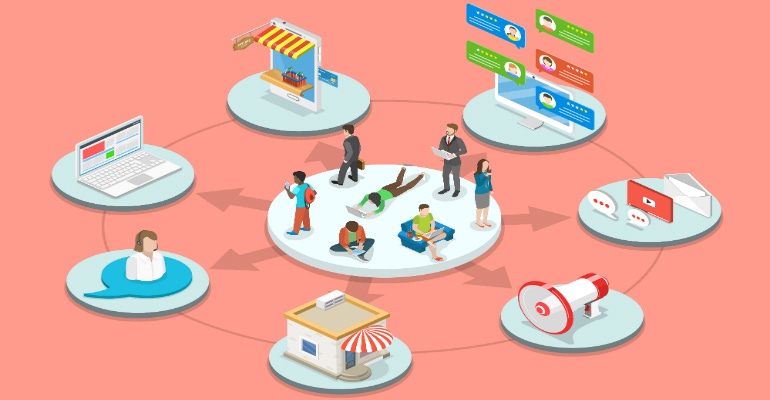Opportunity Omnichannel: MSPs Can Prime the Services Pump
The omnichannel sales model is quickly gaining traction in both the retail and wholesale markets, yet very few organizations truly understand what the omnichannel is and how to embrace it, creating ample opportunities for MSPs.

For a majority of retailers and wholesalers, omnichannel is an ideology that they know they must pursue, yet do not fully understand its significance, equating to an axiom of “we must have an omnichannel, but what is it?”
It’s a legitimate question, one that is perhaps best answered by managed service providers looking to create new opportunities.
MSPs must be able to tackle the question of what constitutes an omnichannel, and offer a definition that makes the most sense to B2B and B2C businesses. That might not be as easily said as done. After all, different market segments have different definitions of what constitutes an omnichannel. Yet, the various definitions all have one element in common: Omnichannel is an ideology that integrates multiple sales channels into a single, seamless experience for the customer. Ideally, an omnichannel approach allows customers to buy products using any one of multiple methods or technologies. The key aspect is integration across channels that unifies the purchasing experience. In that unified experience, MSPs can build the platforms that make omnichannel a reality for businesses. MSPs are able to mash up cloud services, in the forms of online sales tools, retail support systems and mobile-device platforms to create an encompassing omnichannel solution. It’s a critical service for small and medium businesses that lack the technology and logistics to even normally consider an omnichannel approach.
MSPs will need to consider that omnichannel brings forth the idea of customer-centricity, where the shopping experience is optimized for the customer, regardless of the methodology used to make a purchase. In other words, the customer could expect the same level of service when buying online, at a physical location or using a mobile device.
Creating an omnichannel takes an investment in technology that can support the various aspects of order processing, which might also include the digital and physical supply chain. That means MSPs can approach building an omnichannel platform by leveraging hosted supply-chain management (SCM) solutions, creating an additional opportunity to build services for B2B and B2C businesses. Ideally, the goal would be to implement technology at the supply-chain level that can gather all the data surrounding product movement and interaction to create a seamless workflow process from product origination to delivery to customers.
SCM solutions make omnichannel practical and more effective. As businesses discover that omnichannel becomes the means to participate in hypercompetitive markets, SCM will become the foundation to institute the needed agility and economy to remain competitive. SCM brings with it the advanced concepts that make omnichannel feasible, ideologies such as intelligent disposition, just-in-time delivery, supply-chain analytics, and so on. All of those ideologies help to reduce costs and also minimize touch points, which brings additional efficiencies into the omnichannel realm.
MSPs should be able to position SCM as both a tool set and a strategy that can enable the transition to an omnichannel-based solution for B2B and B2C operations. SCM gives the purveyors of products the ability to compete across channels profitably and offer the right mix of product, price and services. As those channels grow more complex and time-sensitive, SCM brings with it the ability to institute highly capable and agile supply chains.
There are numerous benefits to pairing an omnichannel strategy with an SCM solution, allowing MSPs to bring forth growth opportunities, where flawless e-commerce execution for their customers lends itself to increased sales, revenue growth and better insights into the complete supply chain for predictive analytics. SCM also enables effective change management, leading to the agility needed to address successfully the trends evident with omnichannel sales; for example, sales cycles might vary by region and/or season, requiring that the workflows around omnichannel change as well. Those changes might impact reverse-supply-chain activities, returns-processing, and require the adoption of intelligent disposition tools. Properly implemented SCM allows changes to workflows and incorporates the ability to adapt to change quickly.
Over time, MSPs can use hosted SCM solutions to create the data points needed to better control a customer’s supply chain. Advanced analytics can be used to better calculate inventory placement, allowing businesses to take a more granular approach to fulfillment, without having to over- or underprovision products. SCM brings with it two other important elements of fulfillment in the omnichannel — velocity and value. Ultimately, the goal of omnichannel fulfillment is to have product readily available whenever and wherever the customer wants. SCM makes that possible by containing costs, while allowing sellers to move product quickly to the point of sale, in smaller quantities, while reducing logistics costs.
The omnichannel is much more than an ideology of sell anything, anywhere, and requires the institution of management technology that can deal with products in motion, customer preferences and the logistics of the supply chain, hence the need for SCM to become the strategic foundation of the tactical omnichannel, and when provided as a platform, bring opportunity to MSPs seeking to conquer new business ideologies.
About the Author(s)
You May Also Like


